Book contents
- Frontmatter
- Contents
- Introduction
- I Truth and Some Philosophers
- II Moral Progress: Toward More Inclusive Communities
- 9 Human Rights, Rationality, and Sentimentality
- 10 Rationality and Cultural Difference
- 11 Feminism and Pragmatism
- 12 The End of Leninism, Havel, and Social Hope
- III The Role of Philosophy in Human Progress
- Index
10 - Rationality and Cultural Difference
Published online by Cambridge University Press: 06 July 2010
- Frontmatter
- Contents
- Introduction
- I Truth and Some Philosophers
- II Moral Progress: Toward More Inclusive Communities
- 9 Human Rights, Rationality, and Sentimentality
- 10 Rationality and Cultural Difference
- 11 Feminism and Pragmatism
- 12 The End of Leninism, Havel, and Social Hope
- III The Role of Philosophy in Human Progress
- Index
Summary
In this essay I discuss some of the questions that come up when some cultures are said to be more rational, and therefore better, than others. These questions also arise when some cultures are said to be less rationalistic, and therefore better, than others. I shall begin by distinguishing three senses of the term “rationality.”
Rationality1 is the name of an ability that squids have more of than amoebas, that language-using human beings have more of than non-language-using anthropoids, and that human beings armed with modern technology have more of than those not so armed: the ability to cope with the environment by adjusting one's reactions to environmental stimuli in complex and delicate ways. This is sometimes called “technical reason” and sometimes “skill at survival.” It is ethically neutral, in the sense that this ability, by itself, does not help one decide what species or what culture it would be best to belong to.
Rationality2 is the name of an extra added ingredient that human beings have and brutes do not. The presence of this ingredient within us is a reason to describe ourselves in different terms than those we use to describe nonhuman organisms. This presence cannot be reduced to a difference in degree of our possession of rationality1. It is distinct because it sets goals other than mere survival; for example, it may tell you that it would be better to be dead than to do certain things. Appeal to rationality2 establishes an evaluative hierarchy rather than simply adjusting means to taken-for-granted ends.
- Type
- Chapter
- Information
- Truth and ProgressPhilosophical Papers, pp. 186 - 201Publisher: Cambridge University PressPrint publication year: 1998
- 3
- Cited by



